May Read online
KATHRYN LASKY
DAUGHTERS of the SEA
May
SCHOLASTIC PRESS / NEW YORK
CONTENTS
Cover
Title Page
Epigraph
PROLOGUE MAINE COAST, OFF SIMON’S LEDGE, 1883
WINTER 1898
1 THE BROKEN CHIMNEY
2 THE SURGE WITHIN
3 SOUNDS WITHIN THE STORM
4 THE CLOSET
5 THE DOCTOR’S VISIT
6 A YEARNING DETECTED
SPRING 1899
7 “YOU HORRID GIRL!”
8 A VISITOR
9 THE KEY
10 AN EXTRAORDINARY IDEA
11 BELONGING
12 FIRST SELF
13 THE HALF OF IT
14 THE BONES
15 LUCKY
16 WAITING
17 AVALONIA
18 THE CEMETERY
SUMMER 1899
19 THE SHAPE BESIDE ME
20 “WHO NAMES THE STARS?”
21 SHADES OF GRAY
22 A STRANGE ENCOUNTER
23 OPPOSITE SHORES
24 A DECISION
25 THE DEEP YEARNING
26 A STAR-SPIKED NIGHT
27 HARD QUESTIONS
28 “IT’S HAPPENED!”
29 “I AM MAY!”
30 MY SISTER, MYSELF
31 THE COLDEST WORD
32 FASTER THAN AN EAGLE?
33 THE HMS RESOLUTE
34 WHITE SQUALL
35 “YOU ARE THE WORLD!”
About the Author
Copyright
Epigraph
Exultation is the going
Of an inland soul to sea,
Past the houses—past the headlands—
Into deep Eternity—
Bred as we, among the mountains,
Can the sailor understand
The divine intoxication
Of the first league out from land?
— Emily Dickinson
PROLOGUE
MAINE COAST, OFF SIMON’S LEDGE, 1883
THE FOG HAD SET IN THICK after the storm, pushed by a southeast wind. But he couldn’t wait any longer. He had to check his traps. When the nor’easter had blasted through two days before, it had been fierce—almost hurricane force, although it wasn’t the season. A ship had gone down, and two fishing trawlers were lost to the south, somewhere off Georges Bank. No hope for any of those vessels. He would keep his eye out for debris. He was worried about his lobster traps—how many had broken free from their buoys or been dragged by the turmoil of confused winds and currents that followed a storm of such force? If a fisherman was out now it wasn’t the storm itself that was threatening but the aftermath. It was the lost gear, the lost lobsters, the lost money.
His income tending the Egg Rock Lighthouse was barely adequate. But between lobstering and getting the occasional deck job on a trawler he could make just about enough for their life at the lighthouse. He and his wife had never been blessed with children. It would be hard, he supposed, to support a child — not with all the doctoring that Zeeba required. She had just gone to a new doctor last month over in Surrey, who had given her some different stomach powders. They cost, they did! He wondered if a baby would have made a difference for them, for their marriage.
But her numerous afflictions required Zeeba’s full attention; she kept meticulous charts recording her fevers, bodily functions, and pulse rate. Hepzibah Plum always set off for the doctor well armed, dauntingly armed, with information. One doctor even told her that she could be a doctor. That was probably the happiest day of Zeeba’s life. She came back to Egg Rock absolutely hooting about that.
Edgar Plum peered into the fog. So dense. If it would only begin to fray a bit, unravel the gray so that he could see something—even just the loom, or the dark shadow of the island that lifted out of the fog. He was looking for Burnt Porcupine, where he had set some traps. He caught the fishy smell of seals basking in the thick mists of fog on the ledge, so he must be near.
The chop diminished, and the water now was relatively calm. Everything seemed unusually quiet. No sound of waves slapping into one another. The remaining noises were intermittent and yet distinct — the luff of his sail as it relaxed in this windless pocket of air, the distant disembodied chimes of a bell buoy cut by the whine of a seagull’s cry. All these were familiar to him. But then something caught his attention. It was an odd noise—wood? Possibly. A timber or maybe a lobster trap come loose, drifting about, smacked by something. But suddenly there was another sound, a tone that laced through the fog. He froze at the tiller of his small sailing skiff. It was a sweet babbling sound, so sweet, so merry — so human?
He quickly lowered his sail, put out his oars, and began rowing toward the soft, cozy babbling. As he drew nearer he saw a shape in the water. It was rectangular—a sea chest. The lid was flopped open and only attached with one hinge. On either side a dolphin swam, gently poking it this way or that when it listed too far to one side or the other. Overhead a seagull hovered. Edgar Plum caught his breath as he spied a tiny hand waving in the air.
A baby! He was almost too frightened to row toward it, but the dolphins, as if sensing his presence, began to steer the sea chest toward him. The fog had blown off, and rags of mist hung in the air as he looked down and saw the sweet face of an infant with red curls like a luminous cloud of dawn light.
When he picked up the infant he saw that it was wrapped as snug as could be in a gray knit blanket covered by an oilskin cloak. The baby was a girl, as he had suspected when he first saw her. He made a sling so he could carry her neatly under his sou’wester jacket. Before he raised his sail, he reached over and fetched the chest and its lid from the water. When he brought it over the gunwales he could see letters carved on the lid’s top—HMS Resolute.
“HMS Resolute! My word!” Edgar Plum whispered to himself. That was the ship that had gone down off Georges Bank. He stared into the wind that had just sprung up now from the northwest. It had reversed, for the wind had been blowing for the last two days out of the southeast—driving this baby right to me, he thought. He was so brimful of joy that he nearly whooped out loud. It was meant to be. The report said everyone was lost. No hope. But this was hope. We’ll call her Hope, he thought.
They would not call her Hope. When Edgar got home with his bundle, Hepzibah Plum was hanging her head over a pot of steaming camphor broth to treat her lungs.
“Zeeba! Zeeba! Come out from under that tent of yours. I got a surprise for you.”
“Hold your horses.” Her voice floated out from the toweling that covered her head and trapped the vapor. “Just another minute.”
But it was only another few seconds before the baby cried out. Zeeba tore the toweling off her head. Her face was red and blotchy. “What’s that?” She had a thin, angular face, and her cheekbones protruded so that they cast shadows into the hollows beneath them. Around her mouth were vertical crinkles as if invisible drawstrings needed to be pulled for any utterance.
“What in the name of Jesus have you brought home, Gar?”
“A baby, Zeeb, a baby for us.”
“Us?”
“Come on now, come look at her. She’s pretty as can be.”
Hepzibah Plum took mincing steps toward her husband. The drawstrings had pulled taut again, and the hole of her mouth had closed tight. Gar looked at her, expecting an “ooh” or an “aah” of astonishment and wonder. But no sound was emitted. In fact, her lips pressed tighter together.
You won’t need no more medicines. No more powders, Gar thought. “God has finally blessed us with a child.” A dark look seeped from Zeeba’s eyes, but Edgar was oblivious. “We’ll call her Hope.”
Zeeba’s brow contracted in a frown. The vertical lines between
her eyebrows deepened. “No! We’ll call her Mabel.”
“Mabel?” Edgar said weakly.
“Yes; Mabel, after my mother. How’d you come by her?”
But Gar knew it was not because Zeeba was honoring her mother. She wanted people to think that she, Hepzibah Plum, was not barren but had at last given birth. She was putting her mark on the child. It was in that moment that Gar decided that he would never tell his wife the truth about where he had found this baby.
“I was down near Crockett Cove.” He decided he had to make it as far away as possible. “A woman down there died in childbirth; no relatives, nothing.”
Hepzibah sighed. “Probably a bastard child.”
The word went through Edgar like an electrical current. “She ain’t no bastard, Hepzibah. Don’t you ever call her that! She’s ours, and we’ll treat her that way, like she was born to us. You and me.” He took a deep breath. “And we’ll call her May for short.” Hepzibah blinked at her husband. She had never heard him speak in this low, firm voice before. It almost scared her. “We got to feed her now. She’s hungry. We got any milk?”
“If you go out and milk Bells we do.”
He started to hand the baby to his wife. She backed away. “I got to go milk the cow, Zeeba, you just said so.”
“I’ll do it. You hold the baby.”
This was the first time in their ten years of married life that Hepzibah Plum had ever milked their cow. As she walked out the door of the lighthouse she turned and said, “You know, I thought I was getting a mite better in my camphor tent there.” She nodded toward the pot simmering on the stove. “But this interruption hasn’t helped.”
“She’s not an interruption, Zeeb, she’s our daughter. She’s May Plum.”
Zeeba pressed her colorless lips into a firm line and turned to the door.
WINTER 1898
1
THE BROKEN CHIMNEY
IT WAS A LATE-SEASON NOR’EASTER. The wind screeched round the squat frame house, and the clapboards moaned periodically as if in reply. Every now and then the light tower that thrust upward sixty-four feet into the storm-rent sky seemed to sway just a bit. But it had been there for decades and had not yet been felled by any weather. May Plum sat in a pool of lamplight, darning a sock. Her mother, across the kitchen in her rocker, had put a compress over her eyes.
“You know, if my eyes hadn’t got so poor I’d be helping you with them socks. I got to go to that new doctor that’s come to the village as soon as this weather breaks.”
“It ain’t going to break for the next few days, Zeeb,” Gar called from his chair. “This wind done set in. It’s blowin’ like …” May kept her eyes on the sock. She could feel her mother tense without looking at her. She knew what was coming, but her father caught himself just in time and swerved mid sentence to avoid cursing. “Blowin’ like stink,” he concluded. May knew what would happen next. She knew them, this room, this island all too well. Nothing ever really changed. She could predict every sigh and groan of her mother, every word her father might or might not speak, depending on how much he had drunk. She heard his sleeve brush the table and she knew that it would be followed by the splash of whiskey being poured into the mug.
Nothing ever changed, not even the seasons. It might be late for nor’easters but in truth, May realized, there was just one season in the lighthouse—winter. It was always dark yet always too hot inside because of her mother’s insistence on keeping the fire in the cast-iron cook-and-heat stove going. Spring might come, and while others flung open their windows and hung out their linens to catch the fresh breezes for a good airing out, Zeeba did not, for she was deeply suspicious of drafts. She regarded these diabolical streams of air as a kind of roaming executioner that could strike anytime. She was always on the alert for an insinuating breeze that in her mind was as pestilent as a rat-borne plague, as infectious as a flea-ridden rabid dog.
Come summer, if the wind was in the right direction, May could catch the joyous shrieks and whoops of children swimming off the town wharf. But she was forbidden from entering the water. When she went to town with her father on a hot day it was almost painful for her to watch the swimmers. Their hair plastered to their heads made them seem sleek as seals and more beautiful than they actually were. It was mostly boys who swam, not girls. Perhaps the wet clothing revealed too much of what was beneath the light cottons and muslins that clung to the girls’ bodies. May’s own figure had begun to change in the last year. She was particularly conscious of Zeeba’s furtive glances and odd comments referring to her robust health while staring at her waist or the bodice of her dress, which might be a bit tight. But still, it was all she could do not to jump in when she heard those children squealing with delight as they ran off the wharf into the water.
And when they reemerged she gaped at them in wonder, for their skin glistened with saltwater. She craved the feeling of those rivulets of seawater that coursed down their arms. She saw the sparkling little liquid spheres caught in their eyelashes and wondered what it felt like to look through a scrim of water drops. Like glistening travelers from far away, the children climbed from the harbor onto the wharf, carrying their souvenirs from another world. The streamlets of water that traced patterns on their shoulders, the twinkling drops in their eyelashes, the rime of salt that formed on their skin as the children baked themselves dry in the sun—these were their keepsakes, their mementos, their artifacts from that lovely and mysterious underwater world.
But could May join them? Never. Swimming was the one subject on which her father and mother agreed. Zeeba objected because “normal” girls didn’t swim. But a few did. May had seen them jumping off the dock in their petticoats. There was no use arguing with her parents, however.
Her father seemed genuinely fearful of her swimming. “Your mother’s right, de-ah. Swimming never brought anybody any good. Bad for your lungs. My uncle, he went overboard. Was only in the water for a minute, no more, and was never the same again.” Gar would not permit her to even wade on the beach of the calm inlet on the back side of Egg Rock Island where the sea furrowed in.
May stole a glance up from her mending and regarded her parents. They both sat in thick shadows. Until they could get to the mainland for oil, the Plums could only use one lamp in the kitchen. It was against the regulations of the lighthouse service board to use its high-quality kerosene for domestic purposes. They were running low on ordinary lamp oil, and since May was doing the darning she got the light. But she did have school-books she wanted to read. Those had to be read in daylight only. “Can’t waste light on books!” That was Zeeba’s constant refrain. The only book that light was wasted on was the Bible. That was the single exception.
School had been May’s only escape from the lighthouse and the unceasing narrative of Zeeba’s illnesses. But before the storm set in her mother had had a bad spell with her stomach and insisted that May stay home from school in Bar Harbor, on the big island of Mount Desert, for most of the past month. Then just when her mother was feeling better the storm hit so it was impossible for her father to take her in the skiff, even though it was a short sail. She would be behind in everything! And whenever she did open her books, Zeeba seemed to resent it. It wasn’t simply what she said that suggested her irritation with “book learning,” as Zeeba called it, but her dark glances, the little snorts that issued forth every time May sat down to read or try to do arithmetic problems in the math book. She had a peculiar way of staring at her, staring at May so hard it felt as if Zeeba’s eyes were drilling through her. And they did. They wrecked her concentration. She couldn’t believe how many mistakes she had made in a simple set of fractions. It was useless to be in the same room with her mother when she was trying to do homework.
But May couldn’t wait to get back to school even if she was behind in every subject. If only Zeeba wouldn’t get sick again! She glanced at her mother and then at the lamp.
Meanwhile, the storm continued to rage outside, sealing them off more compl
etely than ever from the big island of Mount Desert. The mail boat had not come out for days now. Too rough. Not that May ever received a letter. Still, it was nice to go down to the pier when Captain Weed delivered her parents’ mail.
The stifling predictability of her life in this house, on this drear and forlorn rockbound tiny island in a boiling sea, was almost too much. Why had it begun to grate on her so intensely these last few months? She had lived with it all her life, but right now she felt as if she could not stand another minute. The space was too tight. There was really only room for Zeeba and her sicknesses.
In general Hepzibah Plum preferred the word fail to sick. Her eyes were failing, her lungs were failing, her arthritic joints were failing, and, of course, her heart, with its strange syncopated rhythms, was failing. But even preferable to the word fail was complications. Complications suggested the awesome mystery of her illnesses. She was extremely proud of her heart, with its peculiar beat. It had defied diagnosis by all the best doctors from Bar Harbor to Eastport and right on down south and west to Cape Rosier. It was Hepzibah’s dream to go to Boston and be examined by the finest doctors in America at the Massachusetts General Hospital. She lived to be diagnosed with something horrific, and then presumably die very happily. Happily ever after had a meaning for Hepzibah that had nothing to do with storybooks or fairy tales. It meant a death dignified and certified by Boston doctors.
May looked again at Zeeba. How could she be so different from her own mother? Her mother’s hair, thin and dark with iron-gray streaks, was skinned straight up into a knob that perched on top of her head. It was pulled so tight that it seemed to May to have permanently dragged the top of Hepzibah’s ears into two sharp points, as if they were trying to leap up there and keep company with that nodule of hair. Her face appeared waxen and was grooved rather than wrinkled. Two deep trenches ran from either side of her nose to the corners of her thin, colorless lips. There were liver spots on her cheekbones, and beneath her eyes there were small gray pouches with a tinge of yellow that reminded May of raw clams.

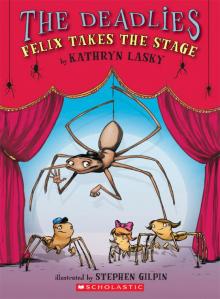 Felix Takes the Stage
Felix Takes the Stage Lucy
Lucy Lone Wolf
Lone Wolf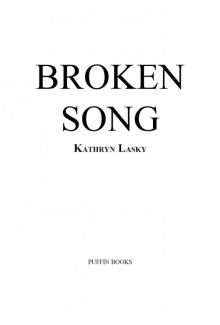 Broken Song
Broken Song The Shattering
The Shattering The Crossing
The Crossing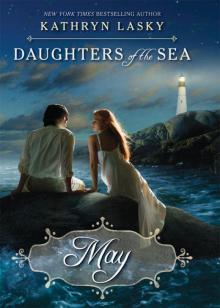 May
May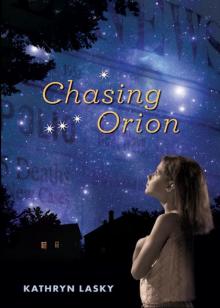 Chasing Orion
Chasing Orion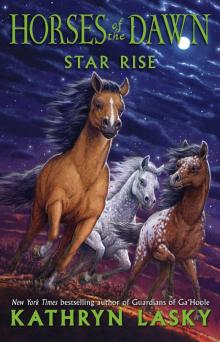 Star Rise
Star Rise The River of Wind
The River of Wind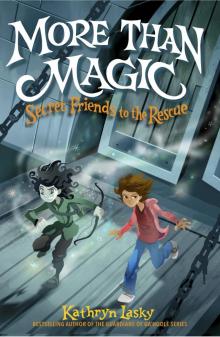 More Than Magic
More Than Magic Born to Rule
Born to Rule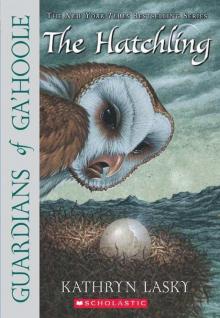 The Hatchling
The Hatchling The Rescue
The Rescue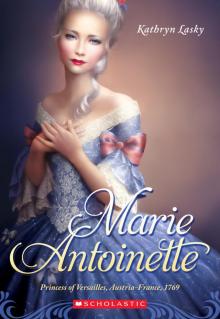 Marie Antoinette: Princess of Versailles, Austria - France, 1769
Marie Antoinette: Princess of Versailles, Austria - France, 1769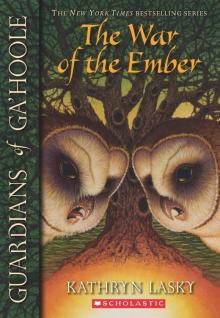 The War of the Ember
The War of the Ember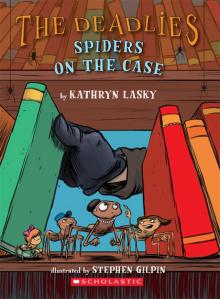 Spiders on the Case
Spiders on the Case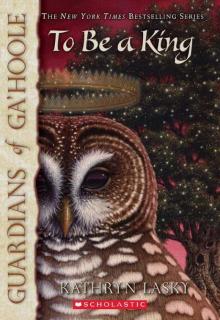 To Be a King
To Be a King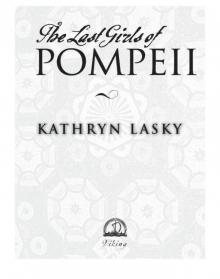 The Last Girls of Pompeii
The Last Girls of Pompeii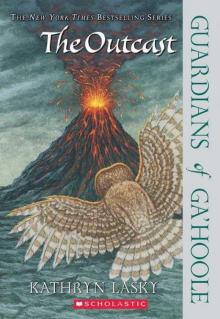 The Outcast
The Outcast Exile
Exile Night Witches
Night Witches Spirit Wolf
Spirit Wolf The Quest of the Cubs
The Quest of the Cubs Frost Wolf
Frost Wolf The Keepers of the Keys
The Keepers of the Keys The Extra
The Extra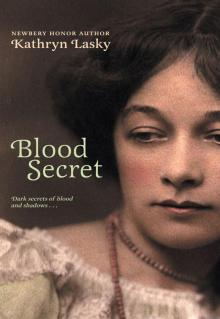 Blood Secret
Blood Secret Watch Wolf
Watch Wolf Blazing West, the Journal of Augustus Pelletier, the Lewis and Clark Expedition
Blazing West, the Journal of Augustus Pelletier, the Lewis and Clark Expedition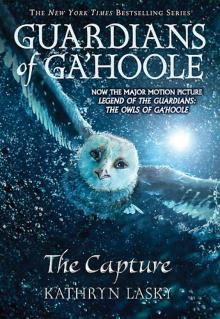 The Capture
The Capture The Burning
The Burning The Journey
The Journey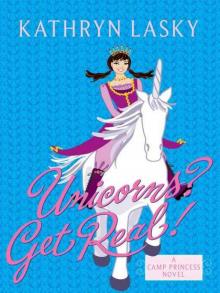 Unicorns? Get Real!
Unicorns? Get Real! The Escape
The Escape Star Wolf
Star Wolf Ashes
Ashes Wild Blood
Wild Blood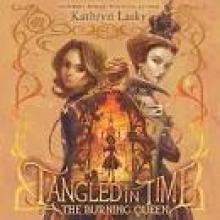 Tangled in Time 2
Tangled in Time 2 The Siege
The Siege Hannah
Hannah Elizabeth
Elizabeth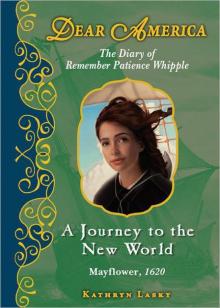 A Journey to the New World
A Journey to the New World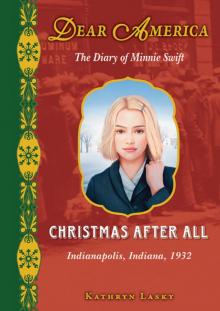 Christmas After All
Christmas After All Mary Queen of Scots
Mary Queen of Scots